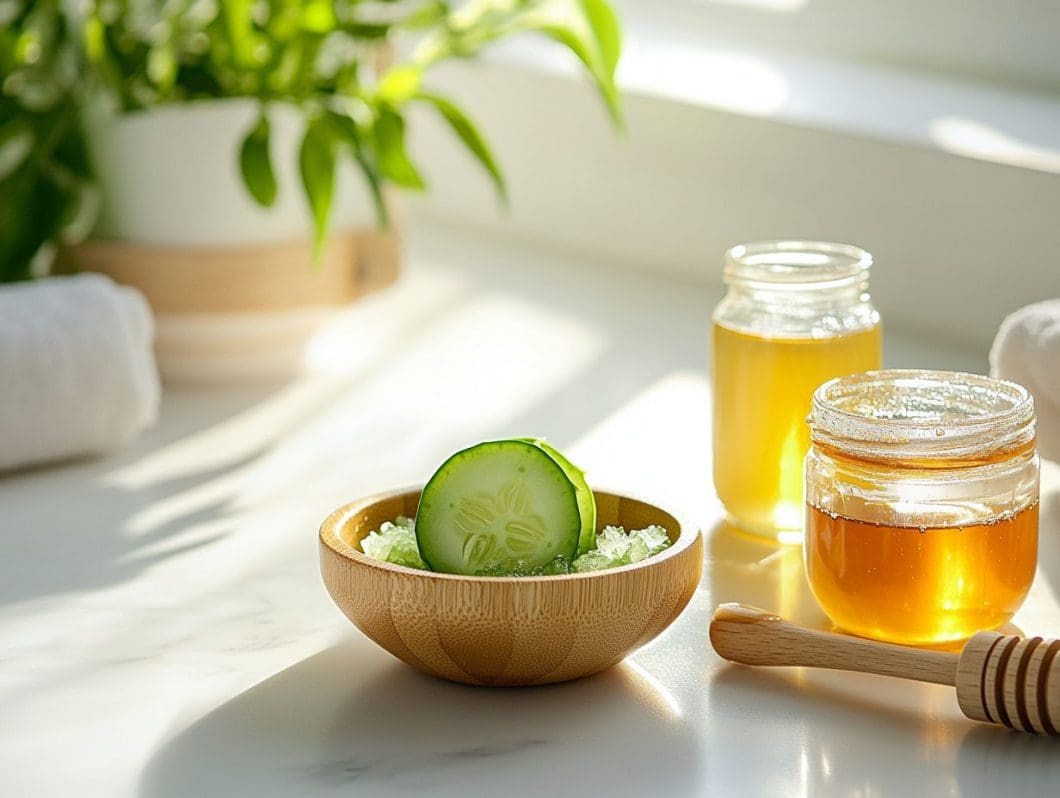Acne can be a frustrating and persistent issue for many, causing various types of acne lesions like whiteheads and blackheads, affecting not just skin health but also self-esteem.
Understanding the underlying causes and contributing factors, such as overactive sebaceous glands and hormonal imbalances, is key to managing this condition effectively.
This article explores natural remedies that can help treat acne, including home remedies and skincare products such as:
- Topical treatments like aloe vera, green tea, and apple cider vinegar
- Dietary changes including the use of antioxidants like green tea and zinc-rich foods
- Beneficial supplements such as turmeric and zinc
It also discusses preventative measures to keep breakouts at bay, the role of anti-inflammatory ingredients, and highlights when it’s crucial to seek professional medical advice, especially from a dermatologist.
Discover the holistic approach to clearer, healthier skin!
Table of Contents
Understanding Acne-Prone Skin
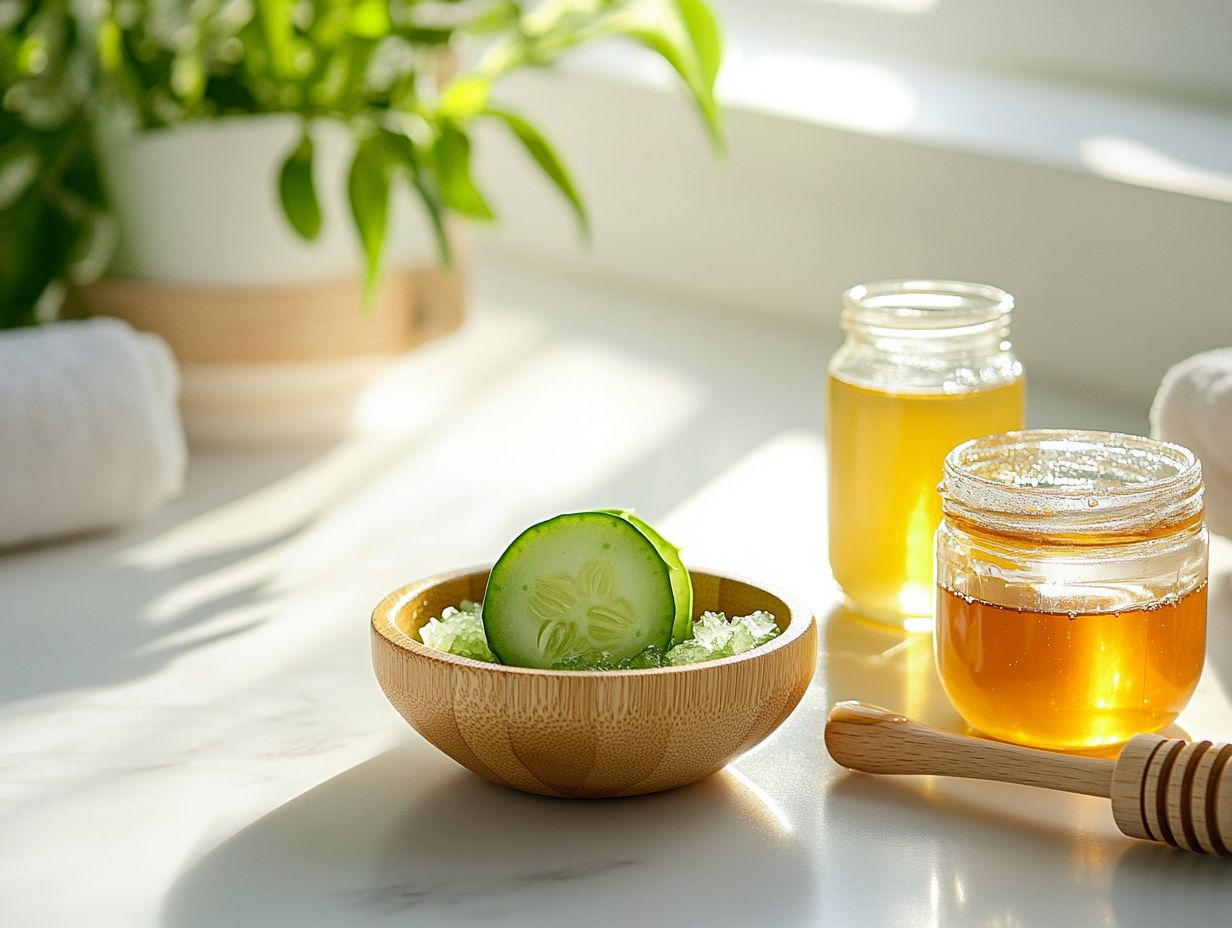
A comprehensive understanding of acne-prone skin is essential for effective acne treatment and overall skin health management. Various factors contribute to the development of acne, including hormonal imbalances, overactive sebaceous glands, and inflammation. Conditions such as seborrheic dermatitis can also exacerbate acne issues.
Dermatology experts, such as Dr. Lisa Hitchins from the Dermatology Center of Northwest Houston, underscore the significance of recognizing these factors in order to develop tailored treatment plans for individuals facing hormonal acne and related skin concerns, often recommending prescriptions and over-the-counter treatments.
Causes and Contributing Factors
Acne can arise from various underlying factors, including hormonal imbalances associated with conditions such as Polycystic Ovarian Syndrome, inflammation caused by C. acnes bacteria, and skin irritation stemming from certain lifestyle changes.
These elements can significantly disrupt the skin’s microenvironment, resulting in a cycle of breakouts that many individuals find challenging to manage. Hormonal fluctuations, particularly during menstrual cycles or puberty, can lead to increased sebum production, which clogs pores and creates optimal conditions for acne development.
Inflammation, often worsened by the presence of C. acnes bacteria, can exacerbate existing conditions by attracting additional immune cells to the site, thereby promoting redness and swelling.
Moreover, irritants from unsuitable skincare products, harsh environmental conditions, and stress can contribute to skin sensitivity, further complicating the acne issue. A comprehensive understanding of these contributing factors enables individuals to more effectively navigate their skincare journey.
Natural Remedies for Treating Acne
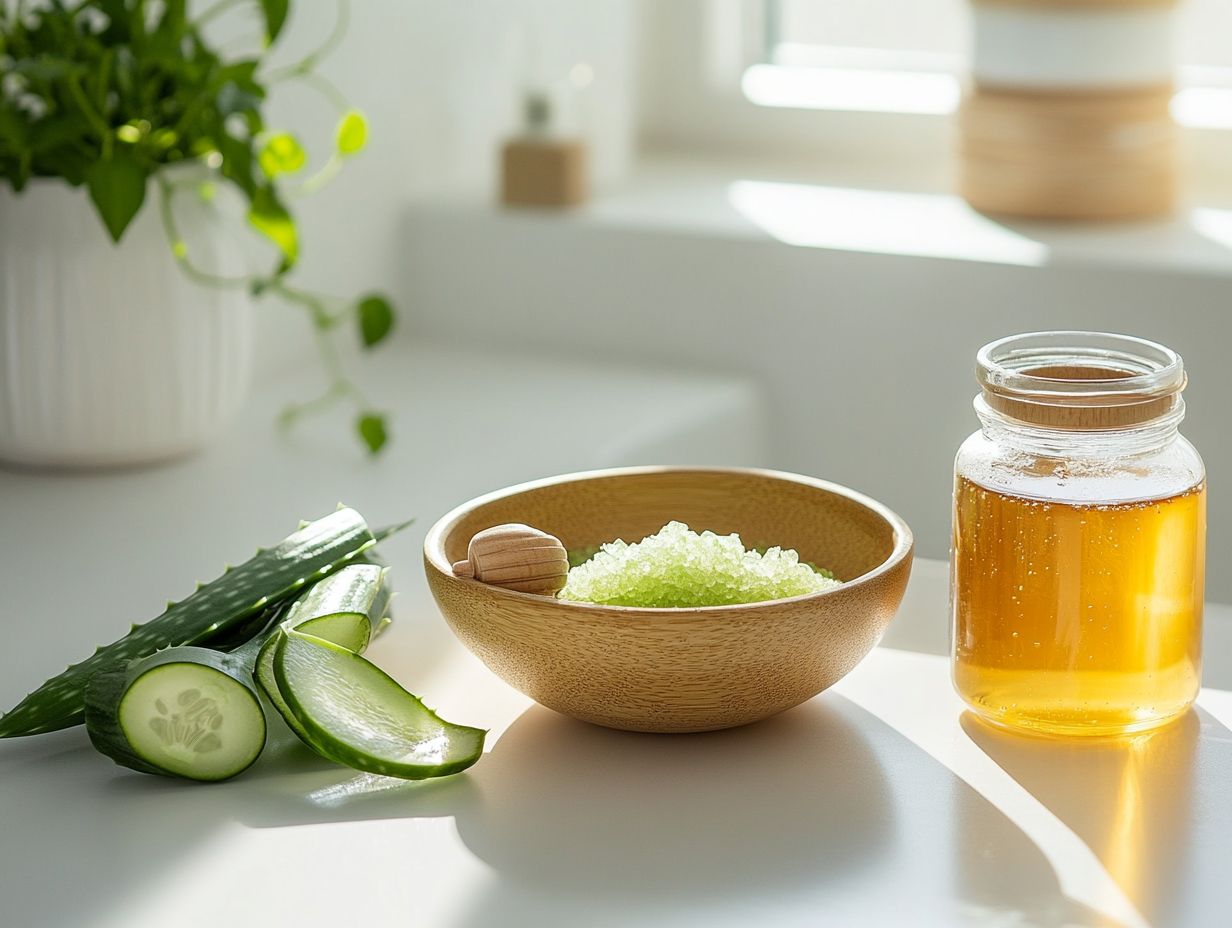
Natural remedies for treating acne can serve as effective alternatives or supplements to conventional acne treatment methods. For more information, check out Natural Remedies for Acne-Prone Skin. Many home remedies, such as honey and baking soda, can also be useful.
Ingredients such as aloe vera, green tea, and apple cider vinegar are recognized for their anti-inflammatory and antibacterial properties, making them valuable options for individuals seeking holistic approaches to acne management. Essential oils like tea tree oil and jojoba oil are also popular in natural skin care regimens.
Topical Treatments
Topical treatments for acne frequently incorporate ingredients such as tea tree oil, witch hazel, and aloe vera, which are recognized for their anti-inflammatory properties and effectiveness in reducing acne scars. Herbal creams containing these ingredients can also be beneficial.
Plus these natural remedies, numerous dermatologists recommend benzoyl peroxide and salicylic acid due to their antibacterial and exfoliating properties. Benzoyl peroxide functions by penetrating the skin to eliminate bacteria that contribute to acne, while salicylic acid aids in unclogging pores and exfoliating dead skin cells that can trap oil and result in breakouts.
These treatments can be applied directly to the affected areas, typically once or twice daily, and are often substantiated by scientific studies demonstrating their efficacy. By integrating these topical solutions, individuals may achieve a more comprehensive approach to managing their acne, effectively addressing both symptoms and underlying causes. Techniques like microneedling and microdermabrasion can also enhance the skin’s texture and reduce the appearance of acne scars.
Dietary Changes
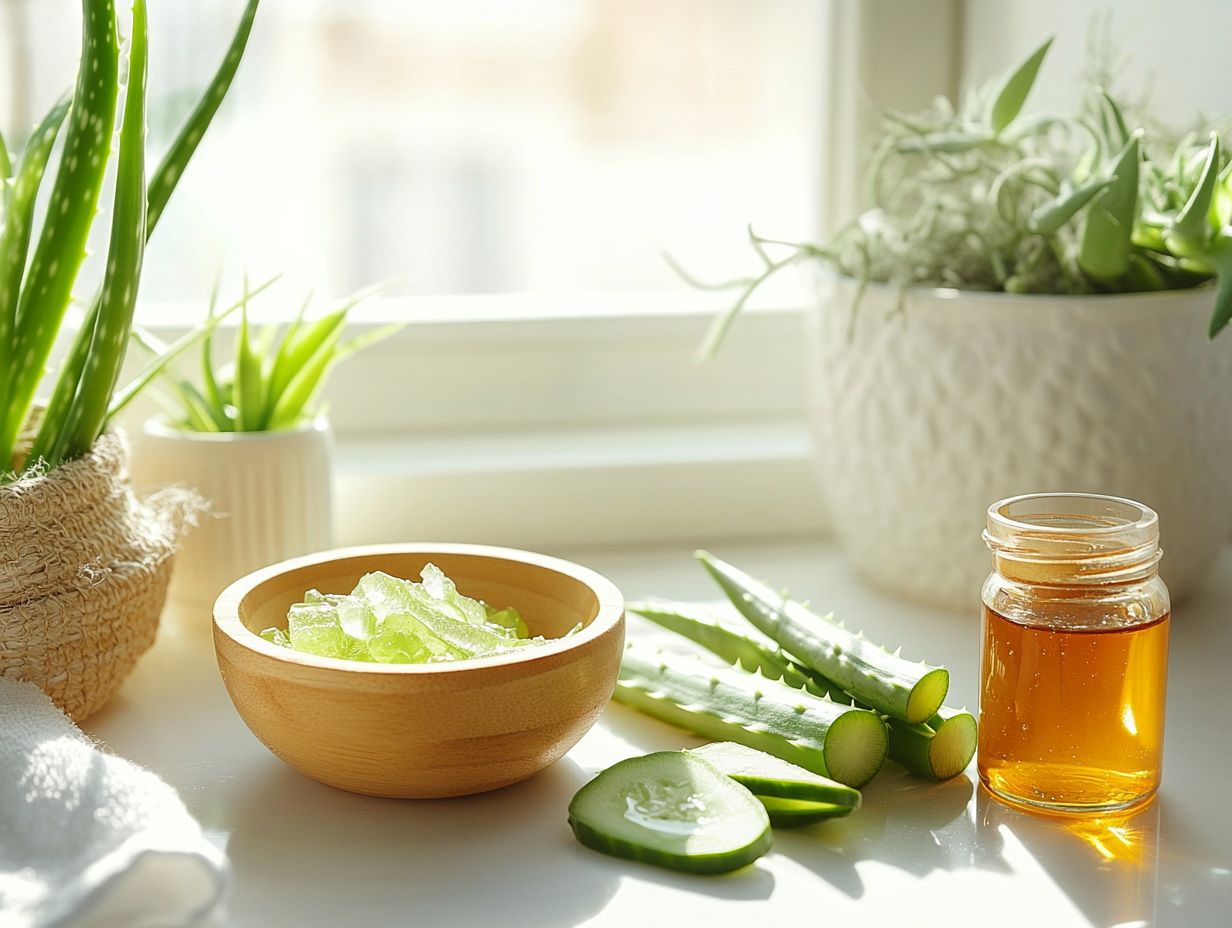
Implementing dietary changes can significantly enhance skin health and assist in managing hormonal acne, particularly through the inclusion of antioxidants and zinc-rich foods to mitigate inflammation. Foods like cucumbers and honey can be particularly beneficial in a healthy skin diet.
These nutrients are essential in safeguarding skin cells from oxidative stress and maintaining a robust immune response. By incorporating more leafy greens, nuts, seeds, and an array of colorful fruits into one’s diet, individuals can naturally increase their intake of antioxidants. Foods such as pumpkin seeds and chickpeas not only supply vital zinc but also facilitate collagen production, which is critical for maintaining skin elasticity.
Moreover, reducing the consumption of sugar and processed foods may contribute to a decrease in breakouts, as a balanced diet is fundamental to achieving clearer, more radiant skin. Establishing a dietary regimen that emphasizes nutrient-dense foods is likely to promote lasting improvements in overall complexion. Oral contraceptives and hormonal birth control pills can also help manage hormonal imbalances contributing to acne.
Supplements and Herbs
Supplements and herbs can play a significant role in the treatment of acne, with options such as turmeric and zinc being particularly recognized for their anti-inflammatory and healing properties. Herbal creams formulated with these ingredients can also be effective.
These natural remedies not only assist in reducing the redness and swelling associated with breakouts but also promote overall skin health. For example, turmeric can be administered in daily doses ranging from 500 to 2,000 mg, while zinc supplementation typically falls between 30 to 50 mg per day. For more insights, check out Natural Remedies for Acne-Prone Skin. Supplements can be particularly effective when used in conjunction with acne treatments prescribed by a dermatologist.
However, it is essential to remain cognizant of potential side effects; excessive zinc intake may result in nausea and headaches, and turmeric could lead to digestive issues in certain individuals.
Incorporating these supplements alongside traditional acne treatments, such as topical retinoids or prescription medications, can offer a more comprehensive approach, enhancing overall effectiveness while minimizing adverse reactions. Practices such as stress reduction techniques and the use of a gentle cleanser can complement these treatments.
Preventing Acne Breakouts
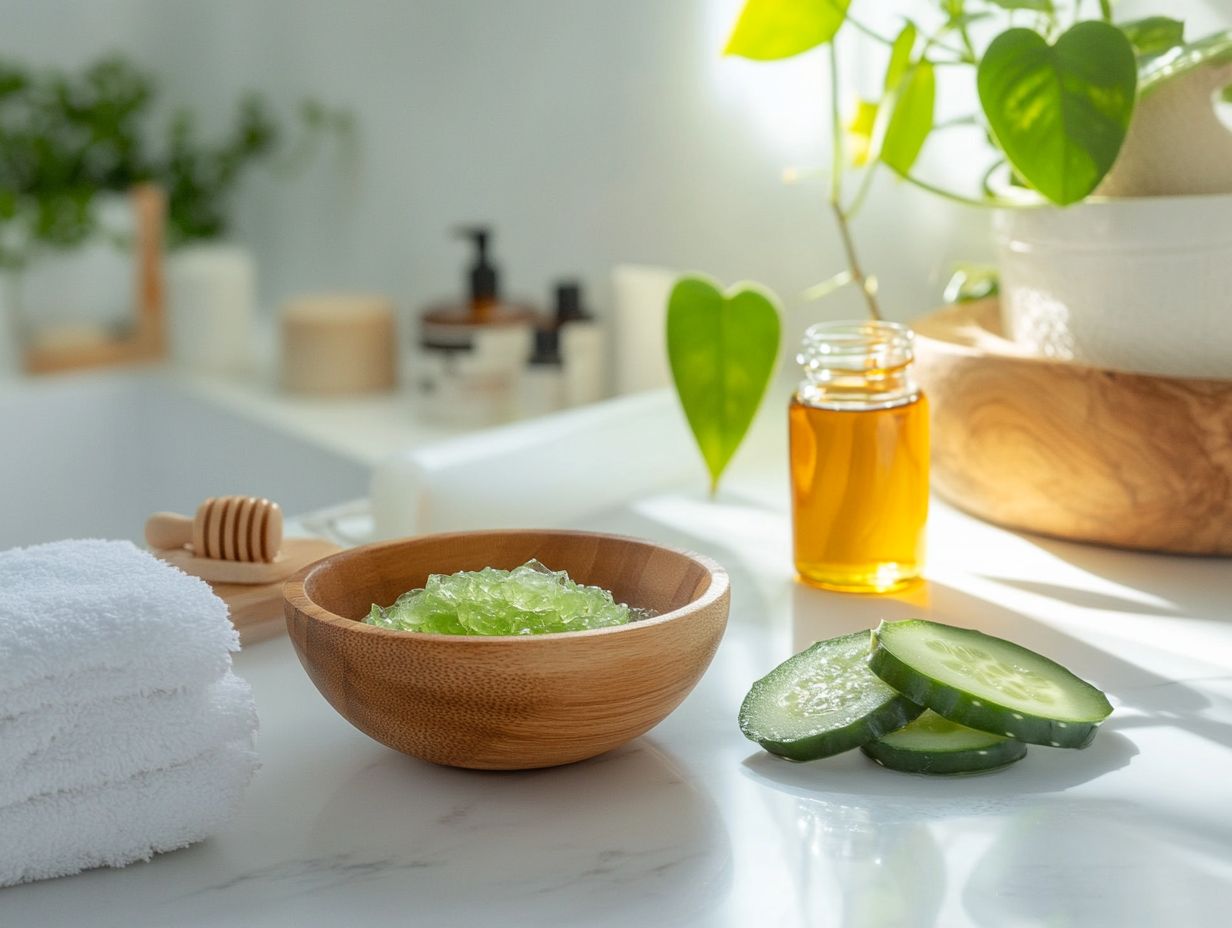
Preventing acne breakouts requires the implementation of effective skincare practices. This includes the use of a gentle cleanser and regular exfoliation to promote clear skin and reduce the occurrence of acne flare-ups. Using non-comedogenic skincare products is also crucial to avoid clogging pores.
Healthy Skincare Habits
Healthy skincare habits are imperative for individuals with acne-prone skin. This includes the use of a gentle cleanser and regular exfoliation to eliminate dead skin cells and prevent clogged pores. Facial masks containing natural ingredients like honey and baking soda can enhance these habits.
Establishing a consistent skincare routine not only aids in managing breakouts but also fosters a clearer complexion over time. It is essential to select non-comedogenic products specifically formulated to meet the unique requirements of oily or blemish-prone skin.
Incorporating a mild exfoliant, whether chemical or physical, can significantly enhance this regimen by removing impurities and promoting cell turnover. This process reduces the frequency of new blemishes while enabling other treatment products to penetrate more effectively, ultimately leading to improved results and enhanced skin texture.
Identifying Triggers and Avoiding Them
Identifying the triggers for acne breakouts is essential, as this knowledge enables individuals to implement necessary lifestyle changes and adopt stress reduction techniques that promote overall skin health.
Common triggers may include hormonal fluctuations, specific dietary choices, and environmental factors such as pollution and humidity. Recognizing patterns in breakouts following stressful events can offer valuable insights into the body’s response to stress. By maintaining a comprehensive diary of dietary habits, skincare routines, and emotional states, individuals can more accurately identify specific triggers.
To mitigate these triggers, it is advisable to establish a consistent skincare regimen, ensure adequate hydration, and consider relaxation practices such as yoga or meditation. These practices can significantly enhance not only skin health but also overall well-being. Regular visits to a dermatologist can also provide professional insights and tailored treatment plans.
When to Seek Medical Treatment
Understanding when to seek medical treatment for acne is crucial, particularly in cases of severe acne or persistent lesions that do not respond to over-the-counter remedies. Treatments at specialized centers like Mount Sinai Hospital can offer advanced solutions for managing severe cases.
Signs of Severe Acne and When to Consult a Doctor
Signs of severe acne include persistent lesions, painful cysts, and significant scarring, indicating the necessity for a consultation with a dermatologist regarding potential prescription medications. Procedures like microdermabrasion can also be recommended for reducing acne scars.
When these conditions become chronic or resistant to over-the-counter treatments, it is especially important to seek professional assistance. Individuals experiencing inflamed acne, particularly nodular or cystic types, often find that home remedies are insufficient. Moreover, acne that results in emotional distress or significantly impacts self-esteem should not be disregarded. Consulting experts like Dr. Joshua Zeichner or Dr. Fran E. Cook-Bolden can provide specialized care.
Dermatologists, such as Dr. Hitchins at the Dermatology Center of Northwest Houston, can provide advanced treatments such as topical retinoids, antibiotics, or hormonal therapies, tailored to the specific type and severity of the acne. These treatments might include addressing hormonal acne and supporting skin health with skincare products. Understanding the various forms of acne, including inflammatory and non-inflammatory types, such as whiteheads and blackheads, can facilitate more effective discussions about symptoms and treatment options with healthcare providers. Additionally, considering acne scars and use of techniques like microneedling and microdermabrasion can be part of a comprehensive acne treatment plan.


